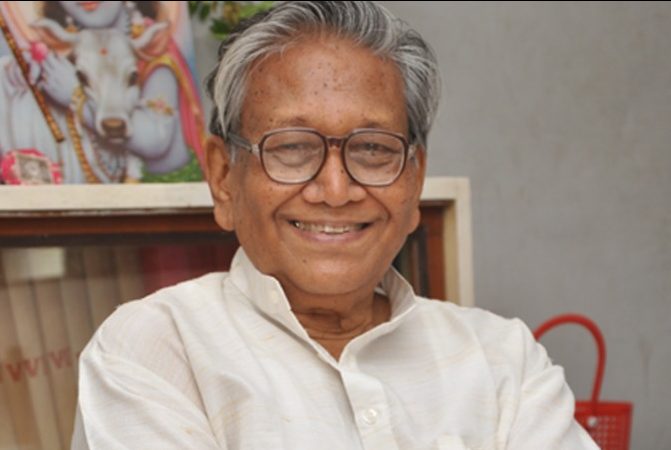Known as the chief architect of transcendental literature in India and beyond, Manoj Das was one of those living writers on whom maximum number scholars have done their doctoral theses.
The Brightest Sun of Indian literature goes down, A permanent void in Odia literary circuit.. A magician who could instil life to his character bids adieu…
These were some of the headlines of popular social media handles after the death of Manoj Das, arguably the greatest writer Odisha has ever produced.
Manoj Das had appeared in Indian-English literary sky as a luminous star during the mid-sixties of last century. Needless to say, he was one of the few gifted writers of India who could write in Odia, his mother tongue and English with equal ease and dexterity.
A follower of the vision and philosophy of Sri Aurobindo and The Mother, Manoj always sought to explore the hidden truth in the different realities of life. He was an optimist who believed in a transformed future of mankind.
A great architect of transcendental literature, Manoj Das dealt with a number of themes. They ranged from the happenings of everyday life to the events suggestive of supernatural. At the same time his stories are greatly influenced by Indian literature-mythology and folklore. As an Indian writer, he has never forgotten to reflect on the age-old rich cultural and literary tradition of India. He always felt that there are certain truths that are found only in Indian culture and they should be presented on global platform. Orissa POST takes a close look at his life and body of works.
Manoj Das was born at Shankhari, a small village in Balasore district. He had started writing early as his first work, a book of poetry in Odia , Satavdira Artanada, was published in 1949 when he was all of 15. He launched a literary magazine, Diganta, in the next year. His first collection of short stories Samudrara Kshudha (Hungry Sea) came out that year.
He was active in student politics while studying BA in Cuttack College. He was a youth leader with radical views during his college days and spent a year in jail for his revolutionary activities. In 1959, he was a delegate to the Afro-Asian students’ conference at Bandung, Indonesia. During his college, he kept on writing and he published a novel ‘Jeebanara Swada’, a collection of short stories titled ‘Vishakanyar Kahani’ and a collection of poems ‘Padadhawani’.
After graduating with a degree in English literature, he got a post graduate degree in English literature from Ravenshaw College. After a short stint as a lecturer in Christ College (Cuttack), he joined Sri Aurobindo Ashram at Pondicherry. Since 1963, he has been a Professor of English Literature at Sri Aurobindo International Centre of Education, Pondicherry.
He edited the cultural magazine, The Heritage, published from Chennai in 1985-1989. This apart, he wrote columns on quest for finding eternal truth in common lives in national dailies like The Times of India, The Hindustan Times, The Hindu and The Statesman.
National and international positions
Among the other important positions that Das held are Member, General Council, Sahitya Akademi, New Delhi 1998–2002, and author-consultant, Ministry of Education, Government of Singapore, 1983–85. He was the leader of the Indian delegation of writers to China (1999).
AWARDS AND HONOURS
- Odisha Sahitya Academi Award (1965 and 1987)
- Kendra Sahitya Akademi Award(1972)
- Sarala Award (1981)
- Vishuba Award (1986)
- Sahitya Bharati Award (1995)
- Saraswati Samman (2000)
- Orissa State Film Award for Best Story (2001)
- Padma Shri (2001)
- Padma Bhushan(2020)
- Sahitya Akademi Fellowship, (2006)
- Atibadi Jagannath Das award (2007)
- NTR Literary Award (2013)
- Amritakeerti Puraskar (2013)
SELECT BODY OF WORKS
Novels
- The Escapist, 2001
- Tandralokara Prahari, 2000
- Aakashra Isara, 1997
- Amruta Phala, 1996 (Saraswati Samman)
- A Tiger at Twilight, 1991
- Bulldozers and Fables and Fantasies for Adults, (1990)
- Cyclones, 1987
- Prabhanjana
- Godhulira Bagha
- Kanaka-Upatyakara Kahani
- Amruta phala
- Sesha tantrikara sandhanare[28]
Short Stories
- Upakatha Sataka
- Abu Purusha
- Sesa Basantara Chithi, 1966
- Manoj Dasanka Katha O Kahani, 1971
- Dhumabha Diganta O Anyana Kahani, 1971
- The Crocodile’s Lady: A Collection of Stories, 1975
- Manoj-pancha-bimsati, 1977
- The Submerged Valley and Other Stories, 1986
- Farewell to a Ghost: Short Stories and a Novelette, 1994
- Legend of the Golden Valley, 1996
- Samudra-kulara Eka Grama (Balya Smruti), 1996
- Aranyaka; (adapted to Aranyaka, 1994)
- Bhinna Manisha O Anyana Kahani
- Abupurusha O Anyana Kahani
- Lakshmira Abhisara
- Abolakara Kahani
- Aranya Ullasha
Fiction
- Chasing the Rainbow: growing up in an Indian village, 2004
Travelogue
- Kete Diganta (Part I)
- Kete Diganta (Part -II)
- Antaranga Bharata (Part I) (My Little India)
- Antaranga Bharata (Part II)
- Dura-Durantara
- Adura Bidesh – 2004
Poetry
- Tuma Gaan O Anyanya Kabita, 1992
- Kabita Utkala
History & culture
- Bharatara Aitihya: Shateka Prashnara Uttara,1999
- Manoj Das Paribesita Upakatha Shataka (Tales Told by Mystics), 2002
- Mahakalara Prahelika O Anyana Jijnansa, 2006
Deeply saddened to know about the passing away of legendary litterateur #ManojDas. Shri Das has left an indelible mark in the field of literature with his vast variety of immortal works and left a void which can never be filled.
— Naveen Patnaik (@Naveen_Odisha) April 27, 2021
